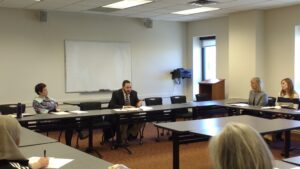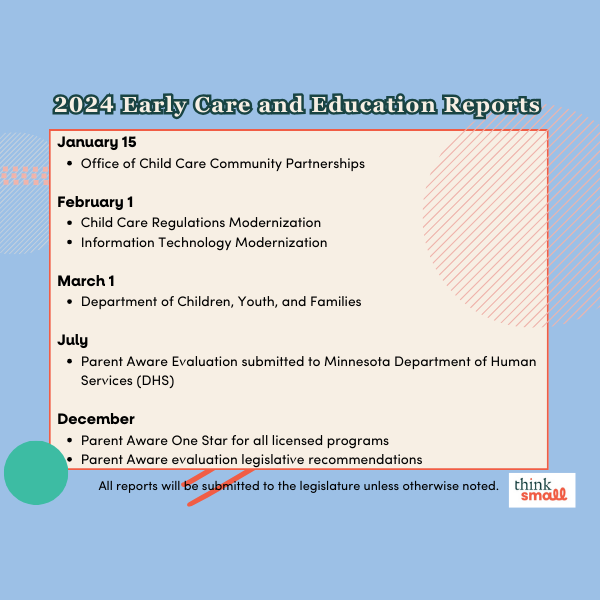 Our March 1, 2016 Policy Hour featured Dan Solomon, Field Representative to Senator Al Franken. While congress has been rather unproductive as of late, Solomon shared some bright spots and opportunities for national progress, especially related to our youngest learners. Senator Franken’s membership on the Senate Health, Education, Labor, and Pensions (HELP) Committee provides him with a way to address many issues that impact children and families.Solomon started by reviewing the biggest education news of 2015, the passage of the Every Student Succeeds Act (ESSA). This legislation replaces No Child Left Behind and includes some provisions for early childhood education. Throughout the bill, early childhood education is listed as an allowable use of funds, including for English Language Learner and Title I instruction.The act also includes $250 million per year in competitive grants for low-income, high-needs early learners. States will compete for these funds which will be administered by the Department of Health and Human Services. Solomon notes that this is not as much as Senator Franken wanted, but it is an important first step.One early learning bill introduced in the 2016 session is The Child Care Access to Resources for Early-Learning Act (Child C.A.R.E. Act). The bill has an ambitious financial ask of $25 billion and aims to improve both funding and quality of care for young children from low-income families.While Minnesotans have widely embraced the importance of early learning, Solomon said the case is still being made at the national level. He suggested participants could help move the discussion along by continuing to share data about the impact of high quality early learning programs. And while Senator Franken has a good grasp on early education, other U.S. representatives in the state could benefit from more information and stories on the topic.He also noted that while Minnesota is good at making the economic and social justice cases for early education, it would be helpful to include more voices in the discussion, including medical and criminal justice professionals who can speak to the negative consequences of not investing in children early.Several participants asked about the state of paid parental leave at the national level. On this issue, both Senator Franken and Representative Betty McCollum lead by example, providing employees with eight weeks paid leave when they have a new child. Children’s Defense Fund noted that a report recently came out which examines options and implications for implementing paid leave in Minnesota. Several people in the room surmised that the policy may be adopted first by federal and state employees before expanding to private settings.When asked about how in touch congress members are with what is happening in states, Solomon said that most have some grasp about what is going on in their own state. Committees sometimes look to other states for models of successful programs they could potentially replicate.Thank you to Dan Solomon for attending Policy Hour.Child C.A.R.E Act Summary: http://static.politico.com/44/7a/9dc7e7ea4d408ad010ae02a394a6/child-care-act.pdfMN Paid Leave Report: http://mn.gov/deed/images/pfml.pdf
Our March 1, 2016 Policy Hour featured Dan Solomon, Field Representative to Senator Al Franken. While congress has been rather unproductive as of late, Solomon shared some bright spots and opportunities for national progress, especially related to our youngest learners. Senator Franken’s membership on the Senate Health, Education, Labor, and Pensions (HELP) Committee provides him with a way to address many issues that impact children and families.Solomon started by reviewing the biggest education news of 2015, the passage of the Every Student Succeeds Act (ESSA). This legislation replaces No Child Left Behind and includes some provisions for early childhood education. Throughout the bill, early childhood education is listed as an allowable use of funds, including for English Language Learner and Title I instruction.The act also includes $250 million per year in competitive grants for low-income, high-needs early learners. States will compete for these funds which will be administered by the Department of Health and Human Services. Solomon notes that this is not as much as Senator Franken wanted, but it is an important first step.One early learning bill introduced in the 2016 session is The Child Care Access to Resources for Early-Learning Act (Child C.A.R.E. Act). The bill has an ambitious financial ask of $25 billion and aims to improve both funding and quality of care for young children from low-income families.While Minnesotans have widely embraced the importance of early learning, Solomon said the case is still being made at the national level. He suggested participants could help move the discussion along by continuing to share data about the impact of high quality early learning programs. And while Senator Franken has a good grasp on early education, other U.S. representatives in the state could benefit from more information and stories on the topic.He also noted that while Minnesota is good at making the economic and social justice cases for early education, it would be helpful to include more voices in the discussion, including medical and criminal justice professionals who can speak to the negative consequences of not investing in children early.Several participants asked about the state of paid parental leave at the national level. On this issue, both Senator Franken and Representative Betty McCollum lead by example, providing employees with eight weeks paid leave when they have a new child. Children’s Defense Fund noted that a report recently came out which examines options and implications for implementing paid leave in Minnesota. Several people in the room surmised that the policy may be adopted first by federal and state employees before expanding to private settings.When asked about how in touch congress members are with what is happening in states, Solomon said that most have some grasp about what is going on in their own state. Committees sometimes look to other states for models of successful programs they could potentially replicate.Thank you to Dan Solomon for attending Policy Hour.Child C.A.R.E Act Summary: http://static.politico.com/44/7a/9dc7e7ea4d408ad010ae02a394a6/child-care-act.pdfMN Paid Leave Report: http://mn.gov/deed/images/pfml.pdf







